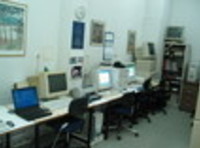Versatility and complex systems in Physics

The Computational Physics group specializes in the study of “Complex Systems”, or “Complexity”, a new area in Physics that sees several Physical Problems as a structure of a Network, where the nodes represent the atoms and molecules and the connections between the nodes represent the existing bonds. A major characteristic is that such problems are studied with the use of large scale computer simulations. In condensed matter Physics, there are many dynamic phenomena offering a wide spectrum of technological applications, primarily in Material Science. Such an example is diffusion. When the materials that we study is not pure but have a variety of impurities, inhomogeneities, breaks, etc. then the laws of diffusion become more complex. The study of materials with Fractal structure is a very good example of this. Additionally, we observe that the simulation techniques that we use can also be extended to other physical systems, which may be completely different from the above. Such examples are the diffusion of medicines in conditions in vivo, the creation and study of neural networks and other networks in the form of Internet, even the dynamics in social networks. This leads to problems of distribution of information to complex structures, such as the development of human language and other interesting problems.
